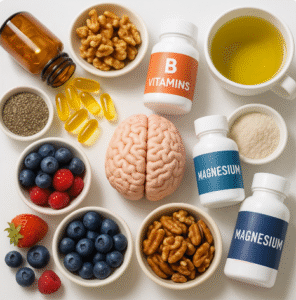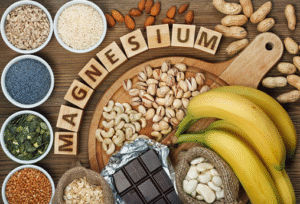Boost Your Cognitive Function with Top-Rated Supplements for Enhanced Memory and Focus
To achieve optimal brain health, it is essential to prioritise overall wellness, particularly as we progress through the complex stages of ageing. A nutritious diet, combined with a healthy lifestyle, establishes the foundation for cognitive vitality. However, integrating specific supplements can offer an additional edge. The market boasts a plethora of supplements designed for brain health, including Omega-3 fatty acids, antioxidants, and probiotics. These potent supplements play a crucial role in preserving memory, sharpening focus, and enhancing mental clarity. In this comprehensive article, we will explore some of the most effective brain health supplements, highlight reputable sources within the UK, and provide practical advice on how to seamlessly incorporate them into your daily routine.
If you would rather listen than read, please click the audio link below.
Discover Trusted UK Brands Offering Premium Quality Brain Health Supplements
Selecting the right brain health supplements involves choosing products from reputable and reliable brands to ensure both quality and efficacy. In the UK, numerous companies have established strong reputations for their commitment to high standards and scientifically validated formulations.
A leading name in this domain is Biocare, a highly regarded brand that provides an extensive array of supplements focused on brain health, featuring targeted formulations rich in Omega-3 fatty acids, B vitamins, and magnesium. Biocare is celebrated for its dedication to research and professional-led product development, making its supplements frequently endorsed by healthcare professionals to bolster cognitive support and promote overall wellness.
Another commendable choice is Cytoplan, a UK-based company that emphasises food-based supplements and ethical sourcing practices. Cytoplan offers an impressive range of brain health supplements, including comprehensive multinutrient blends specifically designed to enhance cognitive function, memory, and mental clarity. Their products are backed by decades of research and are favoured by individuals seeking high-quality, bioavailable nutrients.
For consumers looking for a globally competitive option that delivers exceptional value, LiveGood offers a subscription model that provides premium-quality supplements at affordable prices. LiveGood carefully selects ingredients to formulate brain health supplements aimed at amplifying mental performance, focus, and cognitive longevity. Their commitment to transparency and cost-effectiveness makes them an attractive choice for consumers prioritising both health and budget considerations.
By choosing supplements from respected brands like Biocare, Cytoplan, and LiveGood, consumers can confidently invest in products that effectively and responsibly support their brain health.
Explore the Remarkable Benefits of Omega-3 Fatty Acids for Cognitive Enhancement
Extensive research underscores the vital connection between Omega-3 fatty acids and brain health. Studies consistently reveal their essential role in maintaining peak cognitive performance. Specifically, Omega-3s, comprising EPA (eicosapentaenoic acid) and DHA (docosahexaenoic acid), are integral components of brain cell membranes and are crucial for neuron formation.
According to research, Omega-3 supplementation has been shown to improve memory and cognitive function, especially in older adults and those experiencing cognitive decline. Omega-3s possess anti-inflammatory properties within the brain, significantly lowering the risk of neurodegenerative diseases such as Alzheimer's. Given the brain's vulnerability to oxidative stress and inflammation, ensuring adequate intake of Omega-3s is a proactive strategy for preserving cognitive health over the long term.
Essential Recommendations for Achieving the Ideal Omega-3 Dosage
Guidelines from esteemed organisations, including the British Heart Foundation, recommend that adults should aim for a daily intake of 450mg of combined EPA and DHA. This target can be accomplished through a combination of dietary sources and supplements. For those who struggle to consume sufficient amounts of fatty fish regularly, Omega-3 supplements present a convenient alternative.
It is essential to highlight that while supplements can assist in meeting the recommended intake, they should complement—not replace—a balanced diet. A diverse diet rich in fruits, vegetables, whole grains, and lean proteins is crucial. Before embarking on any new supplementation regimen, individuals should consult healthcare providers to determine the suitable dosage tailored to their unique health needs.
Omega-3 Fatty Acids: A Key Element for Promoting Cardiovascular Health
The advantages of Omega-3 fatty acids extend beyond brain health; they are also integral for cardiovascular health. Research suggests that Omega-3s can effectively lower triglyceride levels, reduce blood pressure, and diminish the risk of heart disease. This multifaceted influence on heart health is particularly significant in the UK, where cardiovascular disease remains a leading cause of morbidity and mortality.
By enhancing blood circulation and alleviating inflammation within the arteries, Omega-3s contribute to improved cardiovascular function. Therefore, incorporating Omega-3 supplements into a health-conscious lifestyle, alongside regular exercise and a balanced diet, can enhance both brain and heart health, supporting a holistic approach to overall wellness.
The Crucial Role of Vitamin B Complex in Enhancing Cognitive Function
Identifying Vital B Vitamins for Optimising Brain Health
The B vitamins family encompasses several essential nutrients that are foundational for sustaining brain health, notably B6 (pyridoxine), B12 (cobalamin), and B9 (folic acid). Each of these vitamins contributes uniquely to neuronal health and cognitive functioning, highlighting the necessity of a balanced intake. In the UK, B vitamins are widely available in various supplement forms, ranging from individual capsules to complex formulations that combine multiple B vitamins for enhanced efficacy.
While many individuals may choose to enhance their diets with B vitamins, numerous food sources provide these vital nutrients. For instance, B6 is abundant in poultry, fish, potatoes, and non-citrus fruits, while folic acid is plentiful in dark leafy greens, legumes, and fortified cereals. Vitamin B12, crucial for maintaining nerve health, is primarily sourced from animal products like meat, dairy, and eggs, making it particularly important for vegetarians and vegans to consider fortified foods or supplements.
The Influence of B Vitamins on Cognitive Function and Emotional Well-Being
Research consistently indicates that B vitamins are integral to fostering cognitive abilities and may assist in preventing mental decline as we age. Specifically, B12, B6, and B9 work together to reduce levels of homocysteine, an amino acid associated with an elevated risk of dementia and Alzheimer's disease when present in high amounts.
By regulating homocysteine levels, these vitamins contribute to enhanced brain health and improved memory performance. Furthermore, B vitamins are essential for synthesising neurotransmitters, the chemical messengers that facilitate communication between nerve cells. This function is particularly crucial for mood regulation and memory, thus linking B vitamin intake to improved mental health outcomes.
In the UK, conditions such as anxiety and depression are increasingly common. Ensuring adequate intake of B vitamins is vital for maintaining cognitive wellness and emotional stability.
Accessible Dietary Sources of B Vitamins Available in the UK
Incorporating sufficient amounts of B vitamins into one’s diet can be straightforward with mindful choices. The UK offers a vast array of dietary sources rich in these essential nutrients. Fortified breakfast cereals provide a convenient way to elevate B vitamin intake, which proves advantageous for individuals striving to meet their daily requirements.
Animal-derived foods also serve as excellent sources of B vitamins. A traditional English breakfast featuring eggs, bacon, and baked beans can significantly enhance B vitamin consumption. However, vegetarians and vegans must pay particular attention to their diets, as plant-based sources of vitamin B12 are limited. Fortified plant milk and nutritional yeast can be valuable alternatives, helping to fill nutritional gaps and supporting adequate B12 intake.
Antioxidants: Protecting Your Brain from Damage
Essential Antioxidants Found in Brain Health Supplements
Antioxidants are crucial compounds that safeguard the body from oxidative stress caused by free radicals, and their significance in brain health cannot be overstated. Common antioxidants found in UK supplements include vitamins C and E, in addition to various flavonoids. 
These supplements work to neutralise free radicals. In doing so, they protect brain cells from damage that could lead to cognitive decline.
Although antioxidants can be ingested through supplements, they are also abundant in a nutritious, balanced diet.
A vibrant array of colourful fruits and vegetables provides excellent sources of these protective compounds. Berries, citrus fruits, and leafy greens stand out as top choices.
Choosing a diet rich in antioxidants not only bolsters brain health but also enhances overall wellness by promoting various bodily functions.
Combating Oxidative Stress with Antioxidants
The brain is particularly vulnerable to oxidative stress, which can lead to inflammation and cellular death. Antioxidants counteract this effect by neutralising free radicals, potentially slowing cognitive decline and providing protection against neurodegenerative diseases. Research indicates that diets abundant in antioxidants are linked to improved mental function and a reduced risk of conditions such as Alzheimer’s and dementia.
Specifically, studies have shown that individuals who consume higher amounts of vitamin E, commonly found in nuts and seeds, experience a slower cognitive decline compared to those with lower intake. Similarly, vitamin C, a powerful antioxidant present in many fruits and vegetables, has been associated with enhanced mental performance.
Top Foods Rich in Antioxidants for Optimal Brain Health
For those keen to boost their antioxidant intake through diet, numerous options are readily available in UK supermarkets. Berries, such as blueberries, strawberries, and blackberries, are not only delicious but also rich in antioxidants. Nuts, particularly walnuts and pecans, represent another outstanding source, providing healthy fats alongside their antioxidant benefits. Green tea, a widely consumed beverage in the UK, is also high in flavonoids, making it an exceptional addition to a diet aimed at enhancing brain function.

Berries abundant in antioxidants
Incorporating these antioxidant-rich foods into daily meals can significantly enhance overall health while specifically benefitting brain function. For example, starting the day with a smoothie packed with berries and spinach can create a positive foundation for cognitive health throughout the day.
The Significance of Antioxidants for Skin Health
While the primary focus here is on brain health, antioxidants also play a vital role in promoting skin health. Vitamins C and E are frequently included in skincare formulations, as they help protect against UV damage and contribute to reducing visible signs of ageing.
A diet rich in antioxidants nurtures the brain while also supporting youthful, radiant skin, creating a dual-purpose strategy for health and beauty.
Utilising both dietary sources and topical applications offers comprehensive benefits. This approach fosters cognitive well-being alongside overall skin health, ultimately enhancing confidence and vitality.
Herbal Supplements: Nature's Partners for Enhancing Cognitive Function
Investigating the Cognitive Advantages of Ginkgo Biloba

Many individuals in the UK commonly turn to Ginkgo biloba as a herbal supplement, known for its potential to enhance cognitive function. Traditional Chinese medicine has historically utilised ginkgo to improve blood circulation to the brain, potentially aiding in memory and cognitive ability.
Research indicates that ginkgo may be especially beneficial for older adults experiencing memory challenges or cognitive decline. Some studies suggest that ginkgo could improve cognitive function in individuals with dementia. However, the findings are mixed, and further research is needed to confirm these effects definitively.
Those considering ginkgo biloba supplements should seek reputable brands available in health stores throughout the UK. As with any supplement, it is wise to consult a healthcare professional before starting a new regimen to ensure it aligns with individual health conditions.
Unveiling the Benefits of Bacopa Monnieri
Bacopa monnieri is another herbal supplement gaining popularity in the UK for its cognitive-enhancing properties. This ancient herb has been used in Ayurvedic medicine to improve memory and reduce anxiety. Studies have shown that bacopa may enhance cognitive function, particularly in areas related to memory recall and learning.
Research suggests that bacopa can help alleviate anxiety, making it an attractive option for those looking to enhance cognitive performance while managing stress levels. Bacopa is available in various forms, including capsules and powders, making it easy to incorporate into daily routines.
As with ginkgo, individuals should consult a healthcare professional before starting bacopa supplements, particularly those who are on medication or have existing health conditions.
Understanding the Regulation and Safety of Herbal Supplements
The Medicines and Healthcare Products Regulatory Agency (MHRA) oversees the regulation of herbal supplements in the UK, including products like ginkgo biloba and Bacopa monnieri. This regulatory framework ensures that these products meet safety and quality standards, offering consumers increased confidence in their choices.
However, regulation does not guarantee absolute safety. Consumers should still conduct thorough research on the products they intend to use.
Purchasing supplements from reputable sources and carefully reviewing product labels can help ensure the quality and efficacy of the supplements.
Turmeric: A Golden Spice with Cognitive Enhancements

Turmeric, a vibrant yellow spice widely available in health food stores across the UK, is celebrated for its anti-inflammatory properties and potential benefits for brain health.
The active compound in turmeric, curcumin, has garnered significant attention for its antioxidant effects and possible role in providing protection against neurodegenerative diseases.
Research suggests that curcumin may enhance mood, reduce inflammation, and even improve cognitive function. For individuals looking to incorporate turmeric into their diets, consider adding it to curries, soups, or smoothies. Turmeric supplements are also readily available for those seeking concentrated doses.
As with other supplements, it is advisable to consult a healthcare provider before initiating turmeric supplementation, especially for individuals with existing health concerns or those taking medications that may interact with turmeric.
Magnesium: The Unsung Mineral Supporting Cognitive Function
Understanding Magnesium’s Essential Role in Brain Function
Magnesium is a vital mineral that plays a significant role in brain function, facilitating neurotransmitter activity and nerve transmission. This mineral is indispensable for mood regulation and enhancing cognitive performance. Adequate magnesium levels can lead to improvements in learning capabilities, memory, and overall brain health. In the UK, magnesium deficiency is a prevalent issue that can result in symptoms such as fatigue, muscle cramps, and potential cognitive impairment. Given its crucial role in supporting cognitive function, ensuring sufficient magnesium intake should be a top priority for those focused on brain health.
For individuals who struggle to meet their magnesium requirements through diet, supplementation is a viable option. Magnesium supplements are available in various forms, including tablets and powders, making it easy to find options that suit personal preferences.
Recognising the Symptoms of Magnesium Deficiency
The symptoms of magnesium deficiency can significantly disrupt daily life, encompassing fatigue, irritability, muscle cramps, and cognitive challenges. In the UK, many individuals may be unaware that they are not meeting their magnesium needs, which can lead to more serious symptoms over time.
Cognitive impairment is particularly concerning, as it can negatively impact memory, attention, and overall mental clarity. By recognising the signs of magnesium deficiency, individuals can take proactive measures to enhance their intake, whether through dietary adjustments or supplementation.
Individuals noticing symptoms should consult a healthcare professional. This enables them to determine whether magnesium deficiency is a contributing factor and allows for the development of a tailored optimisation strategy.
Identifying Dietary Sources of Magnesium Accessible in the UK
 Fortunately, magnesium-rich foods are readily available in the UK, making it relatively simple to increase intake through a balanced diet. Leafy greens, such as spinach and kale, serve as excellent sources, as do nuts and seeds, particularly almonds and pumpkin seeds. Whole grains like brown rice and quinoa also significantly contribute to daily magnesium requirements.
Fortunately, magnesium-rich foods are readily available in the UK, making it relatively simple to increase intake through a balanced diet. Leafy greens, such as spinach and kale, serve as excellent sources, as do nuts and seeds, particularly almonds and pumpkin seeds. Whole grains like brown rice and quinoa also significantly contribute to daily magnesium requirements.
To enhance magnesium intake, individuals can consider incorporating salads rich in leafy greens, snacking on nuts, and opting for whole-grain options in meals. By prioritising these foods, individuals can support both their cognitive function and overall well-being while enjoying a diverse and flavourful diet.
Probiotics: Strengthening the Gut-Brain Connection for Improved Mental Clarity
Understanding the Complex Relationship Between Gut Health and Brain Function
Emerging research increasingly highlights the intricate connection between gut health and brain function, often referred to as the gut-brain axis. Probiotics, the beneficial bacteria that promote gut health, have gained recognition for their potential to enhance cognitive function and emotional well-being.
In the UK, probiotics are widely available in various forms, including capsules, powders, and fermented foods such as yoghurt and kefir. These probiotics help maintain a balanced gut microbiome, which has been linked to improved mood, reduced anxiety, and enhanced cognitive performance.
By incorporating probiotics into their diets, individuals may experience positive effects on both gut health and brain function, thereby supporting overall mental clarity and emotional stability.
Exploring Various Probiotic Strains and Their Health Benefits

Different probiotic strains offer a variety of health benefits. Lactobacillus and Bifidobacterium are among the most commonly found strains in UK supplements.
These strains not only support digestive health and improve nutrient absorption but also contribute to a balanced gut microbiome.
Research indicates that Lactobacillus and Bifidobacterium strains may also positively influence brain health by reducing inflammation and boosting the production of neurotransmitters.
Given the gut's significant role in mental health, ensuring a diverse intake of probiotic strains can substantially enhance both cognitive and emotional well-being.
For those interested in exploring the benefits of probiotics, consider integrating fermented foods or probiotic supplements into your daily routine. As with other supplements, consulting with a healthcare provider is advisable to identify the most suitable strains and dosages.
Ensuring the Safety and Efficacy of Probiotic Supplements
Most individuals in the UK regard probiotic supplements as safe for general use. However, it is crucial to purchase products from reputable manufacturers to ensure quality and efficacy. The MHRA regulates supplements, yet individual brands may vary in formulation and effectiveness. Individuals with pre-existing health conditions or those on medications should consult a healthcare professional before starting probiotics to ensure compatibility and safety. By prioritising safety and efficacy, individuals can confidently support their gut health and, consequently, their cognitive function.
Utilising Supplements to Elevate Brain Health and Cognitive Function
Diving into the world of brain health through supplements can be an empowering strategy to enhance cognitive function and overall well-being. With an abundance of options available, from Omega-3 fatty acids to probiotics, individuals can tailor their supplement routines to meet their specific health needs.
By understanding the role of each supplement and recognising the importance of a balanced diet, individuals can make informed health decisions. As research continues to evolve, staying informed about new findings can further deepen understanding and lead to more effective strategies for maintaining brain health throughout life.
Frequently Asked Questions About Brain Health Supplements
Which supplements are most effective for enhancing brain health?
The most effective supplements for brain health include Omega-3 fatty acids, vitamin B complex, antioxidants, magnesium, and probiotics. Each of these supplements plays a unique role in contributing to cognitive function and overall well-being.
How do Omega-3 fatty acids support brain function?
Omega-3 fatty acids are essential for brain function, as they enhance memory and cognitive performance while also reducing inflammation, thus promoting overall brain health.
Can taking vitamin B complex improve mood?
Absolutely, vitamin B complex can elevate mood by supporting neurotransmitter function and lowering homocysteine levels, which helps diminish the risk of cognitive decline.
What are the best sources of antioxidants?
Foods rich in antioxidants are vital for shielding the brain against oxidative stress. Berries, nuts, dark chocolate, and green tea are excellent options that also promote cognitive health.

Are herbal supplements safe for consumption?
Most herbal supplements, including Ginkgo biloba and Bacopa monnieri, are deemed safe when taken as directed. However, it is always advisable to consult a healthcare professional before use.
What is the recommended daily intake of magnesium?
The recommended daily intake of magnesium varies, but adults should aim for around 300-400 mg. It is advisable to consult with a healthcare provider for personalised recommendations.
How do probiotics enhance brain health?
Probiotics promote gut health, which is intricately linked to brain function. They may help improve mood, decrease anxiety, and enhance cognitive performance.
Can I meet my Omega-3 needs through diet alone?
Yes, consuming fatty fish, nuts, seeds, and algae-based products can provide a sufficient intake of Omega-3s. Supplements are an option for those whose dietary intake is inadequate.
Which foods are particularly high in vitamin B12?
Vitamin B12 is found in animal products such as meat, fish, eggs, and dairy. Fortified cereals and plant-based milks serve as excellent sources for vegetarians and vegans.
How long does it typically take to notice benefits from supplements?
The time required to observe benefits from supplements varies by individual and the specific type of supplement. However, many people may notice improvements within a few weeks to a few months.
Connect with us on Facebook!
The Article: How to Support Brain Health with Supplements appeared first on https://janestevensnutrition.com
The Article: Support Brain Health with Effective Supplements appeared first on https://janestevens.net
The Article Effective Supplements to Support Brain Health Was Found On https://limitsofstrategy.com
The Article Supplements for Brain Health: Boost Your Cognitive Function found first on https://electroquench.com


I really appreciate the focus on cognitive health and the role that supplements can play, especially as we age. It’s interesting how a lot of us might prioritize physical health, like exercise or diet, but neglect the brain’s needs. I’ve recently started incorporating Omega-3s into my routine after reading about their benefits for mood and memory. It’s fascinating how interconnected everything is—good nutrition can influence not just our physical health but also our mental clarity.